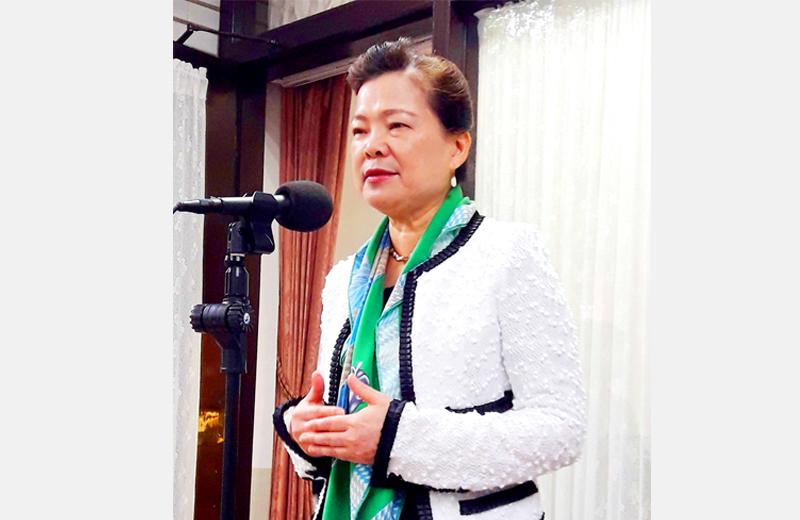Taiwan-US trade relations would remain “on track” regardless of the outcome of yesterday’s presidential elections in the US, Minister of Economic Affairs Wang Mei-hua (王美花) said yesterday.
“Taiwan is a trusted partner of the US,” Wang told reporters at a meeting of the legislature’s Economics Committee in Taipei. “This does not change [depending on] whether the Republicans or the Democrats are in power.”
Taiwan has made significant progress in trade and diplomatic relations with the US in the past few months.

Photo: CNA
Despite protests from China, US Secretary of Health and Human Services Alex Azar met with President Tsai Ing-wen (蔡英文) at the Presidential Office in August. This was followed by a delegation led by US Undersecretary of State for Economic Growth, Energy and the Environment Keith Krach to attend closed-door meetings with government officials and business leaders in Taipei to bolster trade ties.
US President Donald Trump’s bellicose China policy is widely believed to have enabled many of the commercial and diplomatic moves favorable to Taiwan.
On Aug. 28, Tsai announced that the government would on Jan. 1 ease a ban on imports of US pork containing ractopamine and US beef from cattle older than 30 months, despite strong public sentiment, a move that Wang has described as “a necessary precondition” for any bilateral trade agreement with the US.
TRADE TALKS
Asked by reporters how the outcome of the elections might affect possible trade talks with the US, Wang emphasized the importance of “bipartisan support” for Taiwan in the US Congress and the “will of the American people,” rather than tying Taiwan’s gains to a single US political party.
“We have always made friends with the Democrats as well as the Republicans,” Wang said. “The progress we have made in US-Taiwan trade relations in the past few months is due to broad-based positive public sentiment for such policies in the US.”
Saying that the ministry is “in constant contact” with US trade officials, Wang said that she is “waiting to see how things develop” after the elections.
Amid US-China trade tensions and the COVID-19 pandemic, Taiwan has become “the hub for an essential supply chain, especially from the point of view of the US,” she said.
“When US companies look for trusted partners, they look to Taiwan,” Wang said, adding that many leading US tech companies, such as Alphabet Inc’s Google and Microsoft Corp, have “doubled down” on their investments in Taiwan.

KEEPING UP: The acquisition of a cleanroom in Taiwan would enable Micron to increase production in a market where demand continues to outpace supply, a Micron official said Micron Technology Inc has signed a letter of intent to buy a fabrication site in Taiwan from Powerchip Semiconductor Manufacturing Corp (力積電) for US$1.8 billion to expand its production of memory chips. Micron would take control of the P5 site in Miaoli County’s Tongluo Township (銅鑼) and plans to ramp up DRAM production in phases after the transaction closes in the second quarter, the company said in a statement on Saturday. The acquisition includes an existing 12 inch fab cleanroom of 27,871m2 and would further position Micron to address growing global demand for memory solutions, the company said. Micron expects the transaction to

Vincent Wei led fellow Singaporean farmers around an empty Malaysian plot, laying out plans for a greenhouse and rows of leafy vegetables. What he pitched was not just space for crops, but a lifeline for growers struggling to make ends meet in a city-state with high prices and little vacant land. The future agriculture hub is part of a joint special economic zone launched last year by the two neighbors, expected to cost US$123 million and produce 10,000 tonnes of fresh produce annually. It is attracting Singaporean farmers with promises of cheaper land, labor and energy just over the border.

US actor Matthew McConaughey has filed recordings of his image and voice with US patent authorities to protect them from unauthorized usage by artificial intelligence (AI) platforms, a representative said earlier this week. Several video clips and audio recordings were registered by the commercial arm of the Just Keep Livin’ Foundation, a non-profit created by the Oscar-winning actor and his wife, Camila, according to the US Patent and Trademark Office database. Many artists are increasingly concerned about the uncontrolled use of their image via generative AI since the rollout of ChatGPT and other AI-powered tools. Several US states have adopted

A proposed billionaires’ tax in California has ignited a political uproar in Silicon Valley, with tech titans threatening to leave the state while California Governor Gavin Newsom of the Democratic Party maneuvers to defeat a levy that he fears would lead to an exodus of wealth. A technology mecca, California has more billionaires than any other US state — a few hundred, by some estimates. About half its personal income tax revenue, a financial backbone in the nearly US$350 billion budget, comes from the top 1 percent of earners. A large healthcare union is attempting to place a proposal before